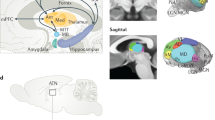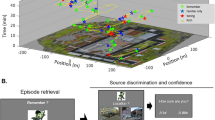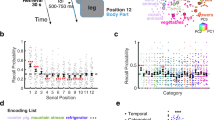Abstract
Human lesion data indicate that an intact left hippocampal formation is necessary for auditory–verbal memory1. By contrast, functional neuroimaging has highlighted the role of the left prefrontal cortex2,3,4 but has generally failed to reveal the predicted left hippocampal activation. Here we describe an experiment involving learning category–exemplar word pairs (such as ‘dog…boxer’) in which we manipulate the novelty of either individual elements or the entire category–exemplar pairing. We demonstrate both left medial temporal (including hippocampal) and left prefrontal activation and show that these activations are dissociable with respect to encoding demands. Left prefrontal activation is maximal with a change in category–exemplar pairings, whereas medial temporal activation is sensitive to the overall degree of novelty. Thus, left prefrontal cortex is sensitive to processes required to establish meaningful connections between a category and its exemplar, a process maximized when a previously formed connection is changed. Conversely, the left medial temporal activation reflects processes that register the overall novelty of the presented material. Our results provide striking evidence of functionally dissociable roles for the prefrontal cortex and hippocampal formation during learning of auditory–verbal material.
This is a preview of subscription content, access via your institution
Access options



Similar content being viewed by others
References
Scoville, W. B. & Milner, B. Loss of recent memory after bilateral hippocampal lesions. J. Neurosurg. Psychiat. 20, 11–21 (1957).
Kapur, S.et al. Neuroanatomical correlates of encoding in episodic memory: levels of processing effect. Proc. Natl Acad. Sci. USA 91, 2008–2011 (1994).
Shallice, T.et al. Brain regions associated with acquisition and retrieval of verbal episodic memory. Nature 368, 633–635 (1994).
Fletcher, P. C.et al. Brain systems for encoding and retrieval of auditory-verbal memory: an in vivo study in humans. Brain 118, 401–416 (1995).
Smith, M. L. in Handbook of Neuropsychology(eds Boller, F. & Grafman, J.) 91–106 (Elsevier Science, Amsterdam, (1989)).
Dimsdale, H., Logue, V. & Piercy, M. Acase of persisting impairment of recent memory following right temporal lobectomy. Neuropsychologia 1, 287–298 (1964).
Zola-Morgan, S. M. & Squire, L. R. The primate hippocampal formation: Evidence for a time-related role in memory storage. Science 250, 288–290 (1990).
Tulving, E., Markowitsch, H., Craik, F. I. M., Habib, R. & Houle, S. Novelty and familiarity activations in PET studies of memory encoding and retrieval. Cerebr. Cort. 6, 71–79 (1996).
Zola-Morgan, S., Squire, L. R. & Amaral, D. G. Human amnesia and the medial temporal region: Enduring memory impairments following a bilateral lesion limited to field CA1 of the hippocampus. J. Neurosci. 6, 2950–2967 (1986).
Grasby, P., Frith, C., Friston, K. J., Frackowiak, R. S. J. & Dolan, R. J. Activation of the human hippocampal formation during auditory–verbal long-term memory function. Neurosci. Lett. 163, 185–188 (1993).
Nyberg, J.et al. General and specific brain regions involved in encoding and retrieval of events: what, where, and when. Proc. Natl Acad. Sci. USA 93, 11280–11285 (1996).
Halgren, E. & Marinkovic, K. in The Cognitive Neurosciences(ed. Gazzinga, M. S.) 1137–1380 (MIT, Cambridge, MA, (1995)).
Fahy, F. L., Riches, I. P. & Brown, M. W. Neuronal activity related to visual recognition memory: long-term memory and the encoding of recency and familiarity information in the primate anterior and medial inferior temporal and rhinal cortex. Exp. Brain Res. 93, 457–472 (1993).
Gershberg, F. B. & Shimamura, A. P. Impaired use of organizational strategies in free recall following frontal lobe damage. Neuropsychologia 13, 1305–1333 (1995).
Knight, R. T. Contribution of human hippocampal region to novelty detection. Nature 383, 256–259 (1996).
Martin, A., Wiggs, C., Ungerleider, L. C. & Haxby, J. C. Neural correlates of category-specific knowledge. Nature 379, 649–652 (1996).
Grady, C. L.et al. Age-related changes in cortical blood flow activation during visual processing of faces and location. J. Neurosci. 14, 1450–1462 (1994).
Stern, C. F.et al. The hippocampal formation participates in novel picture encoding: evidence from functional magnetic resonance imaging. Proc. Natl Acad. Sci. USA 93, 8660–8665 (1996).
Jetter, W., Poser, U., Freeman, R. B. & Markowitsch, H. J. Averbal long term memory deficit in frontal lobe damaged patients. Cortex 22, 229–242 (1986).
Shimamura, A. P., Janowsky, I. S. & Squire, L. R. in Frontal Lobe Function and Dysfunction, 173–198 (Oxford University Press, Oxford, (1991)).
Black, F. W. Cognitive deficits in patients with unilateral war related frontal lobe lesions. J. Clin. Psychol. 32, 366–372 (1976).
Schachter, D. L. Memory, amnesia and frontal-lobe dysfunction. Psychobiology 15, 21–36 (1987).
Shimamura, A. P., Jurica, P. J., Mangels, J. A., Gershberg, F. B. & Knight, R. T. Susceptibility of memory interference effects following frontal lobe damage: findings from tests of paired-associate learning. J. Cog. Neurosci. 7, 144–152 (1995).
Moscovitch, M. in Multiple Dissociations of Function in Amnesia. 337–370 (Hillslade, NJ, (1982)).
Zatorre, R. J. & McEntee, W. Semantic encoding deficits in a case of traumatic amnesia. Brain Cognit. 2, 331–345 (1983).
Schactter, D. L., Alpert, N. M., Savage, C., Rauch, S. L. & Albert, M. S. Conscious recollection and the human hippocampal formation: evidence from positron emission tomography. Proc. Natl Acad. Sci. USA 93, 321–325 (1996).
Li, L., Miller, E. K. & Desimone, R. The representation of stimulus familiarity in the anterior inferior temporal cortex. J. Neurophysiol. 69, 1918–1929 (1993).
Raichle, M. A.et al. Practice-related changes in human brain functional anatomy during nonmotor learning. Cerebr. Cort. 4, 8–26 (1994).
Friston, K. J.et al. Statistical parametric mapping in functional imaging: a general linear approach. Hum. Brain Map. 2, 189–210 (1995).
Acknowledgements
We thank our volunteers and the radiography staff at the Wellcome Department, and R. Lai for library services. R.J.D. and P.F. are supported by the Wellcome Trust.
Author information
Authors and Affiliations
Rights and permissions
About this article
Cite this article
Dolan, R., Fletcher, P. Dissociating prefrontal and hippocampal function in episodic memory encoding. Nature 388, 582–585 (1997). https://doi.org/10.1038/41561
Received:
Accepted:
Issue Date:
DOI: https://doi.org/10.1038/41561
This article is cited by
-
Functional bioengineered models of the central nervous system
Nature Reviews Bioengineering (2023)
-
Causal mapping of human brain function
Nature Reviews Neuroscience (2022)
-
Working memory function in Chinese dyslexic children: A near-infrared spectroscopy study
Journal of Huazhong University of Science and Technology [Medical Sciences] (2012)
-
From uncertainty to reward: BOLD characteristics differentiate signaling pathways
BMC Neuroscience (2009)
-
Sleep benefits subsequent hippocampal functioning
Nature Neuroscience (2009)
Comments
By submitting a comment you agree to abide by our Terms and Community Guidelines. If you find something abusive or that does not comply with our terms or guidelines please flag it as inappropriate.



